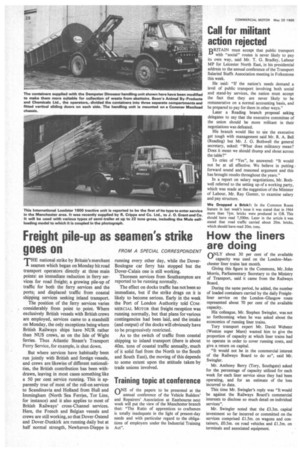Freight pile-up as seamen's strike goes on
Page 30

If you've noticed an error in this article please click here to report it so we can fix it.
FROM A SPECIAL CORRESPONDENT
THE national strike by Britain's merchant seamen which began on Monday hit road transport operators directly at three main points: an immediate reduction in ferry services for road freight; a growing pile-up of traffic for both the ferry services and the ports; and displaced traffic from coastal shipping services seeking inland transport.
The position of the ferry services varies considerably from point to point. Where exclusively British vessels with British crews are employed, services came to a standstill on Monday, the only exceptions being where British Railways ships have NUR rather than NUS crews, as on the Isle of Wight ferries. Thus Atlantic Steam's Transport Ferry Service, for example, is shut down.
But where services have habitually been run jointly with British and foreign vessels, and crews are likewise of different nationalities, the British contribution has been withdrawn, leaving in most cases something like a 50 per cent service running. This is apparently true of most of the roll-on services to Scandinavia and Holland from Hull and Immingham (North Sea Ferries, Tor Line, for instance) and it also applies to most of British Railways' cross-Channel services. Here, the French and Belgian vessels and crews are still working, so that Dover-Ostend and Dover-Dunkirk are running daily but at half normal strength, Newhaven-Dieppe is running every other day, while the DoverBoulogne car ferry has stopped but the Dover-Calais one is still working.
Thoresen services from Southampton are reported to be running normally.
The effect on docks traffic has not been so immediate, but if the strike drags on it is likely to become serious. Early in the week the Port of London Authority told COMMERCIAL MOTOR that freight reception was running normally, but that plans for various contingencies had been laid, and the intake (and output) of the docks will obviously have to be progressively restricted.
As to the switch of traffic from coastal shipping to inland transport (there is about 40m. tons of coastal traffic annually, much of it solid fuel from the North to the South and South East), the moving of this depends to some extent upon the attitude taken by trade unions involved.
Training topic at conference
ONE of the papers to be presented at the
annual conference of the Vehicle Builders' and Repairers' Association at Eastbourne next week will put the view of the Manchester branch that: "The Ratio of apprentices to craftsmen is totally inadequate in the light of present-day needs and with particular regard to the obligations of employers under the Industrial Training Act".




























































































































